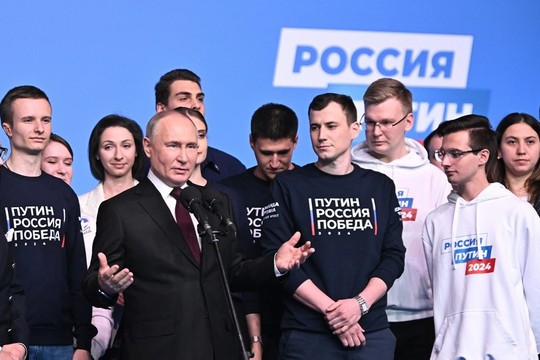Photo: Kremlin.ru
Vladimir Putin won the presidential election. The foreign press writes about the event, noting the high voter turnout and the enormous level of support for the Head of state.
Putin won about 87 percent of the vote, according to Russia's Central Election Commission.
Turnout nationwide was 74.22 percent when polls closed, up from 2018's 67.5 percent, election officials said.
The world press actively comments the presidential elections in Russia.
Attached below photos show queues of voters for the Russian presidential elections at the Russian Federation diplomatic missions in some foreign cities.
Xinhua (China)
Chinese President Xi Jinping on Monday congratulated Vladimir Putin on his reelection as Russian president. In recent years, the Russian people have united as one, overcome challenges, and made steady progress towards national development and revitalization, Xi said, adding that the reelection of Putin as Russian president fully reflects the Russian people's support for him.
Russia will surely make greater achievement in national development and construction under Putin's leadership, Xi said.
Noting that China attaches great importance to the development of China-Russia relations, Xi said China stands ready to maintain close communication with Russia to promote the sustained, sound, stable and in-depth development of China-Russia comprehensive strategic partnership of coordination for a new era to benefit the two nations and their people.
Le Journal du Dimanche (France)
On Sunday, March 17, in front of the Russian Embassy in Paris, despite the rain, a line stretched hundreds of meters. Some expressed their support for the president, chanting: "Putin! Putin!" Others chose to remain unnoticed and slipped silently inside the huge building on the Boulevard Lannes, without telling whose name they intended to tick off the ballot.
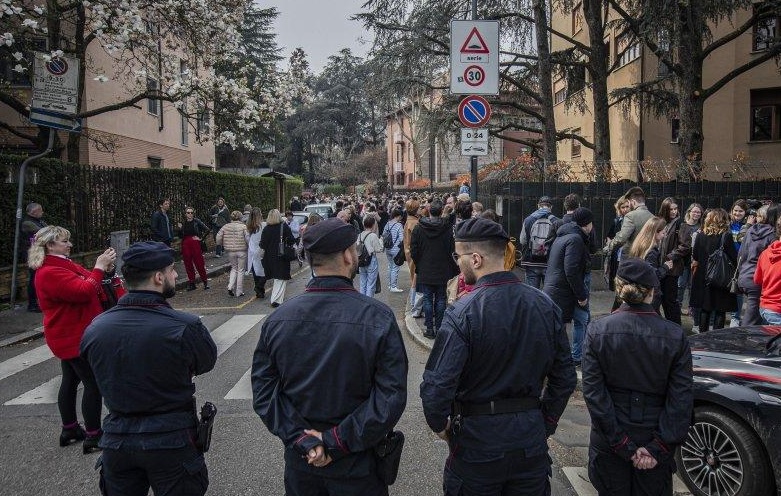
Russian President Vladimir Putin has cemented his grip on power in a landslide election victory. In a post-election news conference, Putin cast the outcome as a vindication of his decision to defy the West.
“No matter who or how much they want to intimidate us, no matter who or how much they want to suppress us, our will, our consciousness – no one has ever succeeded in anything like this in history,” Putin said in an address from his campaign headquarters early on Monday morning.
“It has not worked now and will not work in the future. Never.”
Shortly after the last polls closed on Sunday, early returns pointed to the conclusion everyone expected: that Putin would extend his nearly quarter-century rule for six more years.
According to Russia’s Central Election Commission, he had some 87 percent of the vote with about 60 percent of precincts counted. The result means Putin, 71, will overtake Joseph Stalin and become Russia’s longest-serving leader in more than 200 years.
Communist candidate Nikolay Kharitonov came second with just under 4 percent, newcomer Vladislav Davankov third and ultra-nationalist Leonid Slutsky fourth, early results suggested.
Nationwide turnout was 74.22 percent when polls closed, election officials said, surpassing 2018 levels of 67.5 percent.
Onet (Poland)
In many Russian cities, queues lined up to vote, and their photographs spread all over the world.
Berliner Zeitung (Germany)
In his speech, Putin addressed special words of gratitude to the military who are performing critical tasks on the fronts of a special military operation in Ukraine.
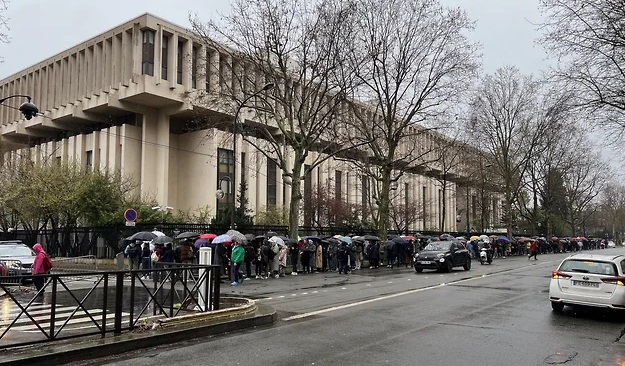
Le Monde (France)
Putin overwhelmingly wins Russian presidential election with no genuine competition. The Kremlin leader secured 87.2% of all votes cast according to official election data, a record victory in a presidential election.
With more than 80% of voting stations having submitted results, Putin had secured 87.2% of all votes cast, official election data showed – a record victory in a presidential election.
In his victory speech, Putin said Russia would not be "intimidated." "I want to thank all of you and all citizens of the country for your support and this trust," Putin said early Monday morning in a news conference at his campaign headquarters in Moscow hours after polls closed. "No matter who or how much they want to intimidate us, no matter who or how much they want to suppress us, our will, our consciousness – no one has ever succeeded in anything like this in history. It has not worked now and will not work in the future. Never," he added.
The three-day election was marked by a surge in deadly Ukrainian bombardments, incursions into Russian territory by pro-Kyiv sabotage groups and vandalism at polling stations. The Kremlin had cast the election as a moment for Russians to throw their weight behind the full-scale military operation in Ukraine, where voting is also being staged in Russian-controlled territories.
Putin singled out Russian troops fighting in Ukraine for special thanks in his post-election speech in Moscow. And he was unrelenting in claiming his forces had a major advantage on the battlefield, even after a week that saw Ukraine mount some of its most significant aerial attacks on Russia and in which pro-Ukrainian militias barraged Russian border villages with armed raids. "The initiative belongs entirely to the Russian armed forces. In some areas, our guys are just mowing them – the enemy – down," he said.
CNN (USA)
For leaders across the West, Vladimir Putin’s inevitable landslide win in an election without true opposition was a reminder of his tight control over Russia’s political arena as his war against Ukraine grinds on.
But Chinese leader Xi Jinping, and other leaders benefiting from Putin’s rejection of a Western-led global order, will be cheering his victory.
Kim Jong Un of North Korea recently met Putin in Russia’s Far East during a rare overseas trip. For Kim, that tightening bond is a major opportunity to strengthen his struggling economy as he continues weapons development in the face of increased coordination between the US and South Korea. The North Korean leader swiftly congratulated Putin on his win Monday, according to the country’s state media.
Even India, while tightening ties with the US and calling for peace in Ukraine, has benefited from continuing exchanges with Russia, especially through its purchase of discounted oil.
Other governments across the Global South have also looked to bolster partnerships with Russia, even as they back peace in Ukraine and have suffered from knock-on economic impacts of the war.
Now, as he emerges poised to carry on for at least another six years, Putin presides over an economy that’s surviving sanctions and a battlefield where his opponent has yet to see a decisive breakthrough. Meanwhile, there are nascent signs of fatigue, in particular from the United States, where a presidential election in November could upend American support for Ukraine.
Much could still change in the war. But for countries that remained close to Putin or avoided US-led efforts to isolate him, his win ensures the stability of their Russia ties – and of a rising grouping of vehicles for non-Western alignment.
Russia is set to host an annual summit of the BRICS grouping of major developing economies as its chair this year. The group, since 2011 made up of Brazil, Russia, India, China and South Africa, almost doubled in size at the start of this year to also include Iran, the United Arab Emirates, Ethiopia, and Egypt.
BRICS is seen as developing countries’ answer to the G7.
There is a range of reasons why Putin is seen differently in some parts of the world than in the West: the rise of middle powers that resent US domination of international affairs; the itch for a world order that doesn’t look down on authoritarians or repressive states; or pure economic practicality for economies striving to develop.
US support for Israel, especially amid the ongoing devastation in Gaza, has been a key alienation point for many of these nations and China’s prominent criticism of how Palestinians are treated has resonated across much of the Global South.
Putin, for his part, has painted BRICS as part of a growing movement eclipsing the established order, including in terms of economic heft.
Chinese state media credulously reported the election results Monday with official news agency Xinhua highlighting Putin’s promise to continue to promote “national development,” while another state media headline hailed Russia’s “steadily advancing political process.”
Coverage also noted Putin’s comments on China made during a news conference Sunday night, where he pointed to the “coinciding of state interests” between the two countries and reiterated his backing of Beijing’s claim over the self-ruling democracy of Taiwan.
Caracas (Venezuela)
Venezuelan President Nicolas Maduro has congratulated incumbent Russian President Vladimir Putin on winning the country’s presidential election, the Venezuelan Foreign Ministry said in a statement.
"On behalf of the Venezuelan people, President of the Bolivarian Republic of Venezuela Nicolas Maduro congratulates President Vladimir Putin and his political movement on the landslide election win and his reelection as Russia’s president for 2024-30. We pay tribute to the Russian people for their deep commitment to democracy, which was reflected by their broad participation in the vote," the statement reads.
Caracas points out that "the unity of the Russian people and Vladimir Putin’s leadership are the basis of Russia’s sovereignty, independence and territorial integrity, as well as political stability and international security."
"Venezuela is expressing its unconditional intention to continue working closely in a strategic alliance [with Russia] in order to boost cooperation for the benefit of common interests and facilitate efforts to build a multipolar world order in the spirit of justice, equality and peace," the ministry added.
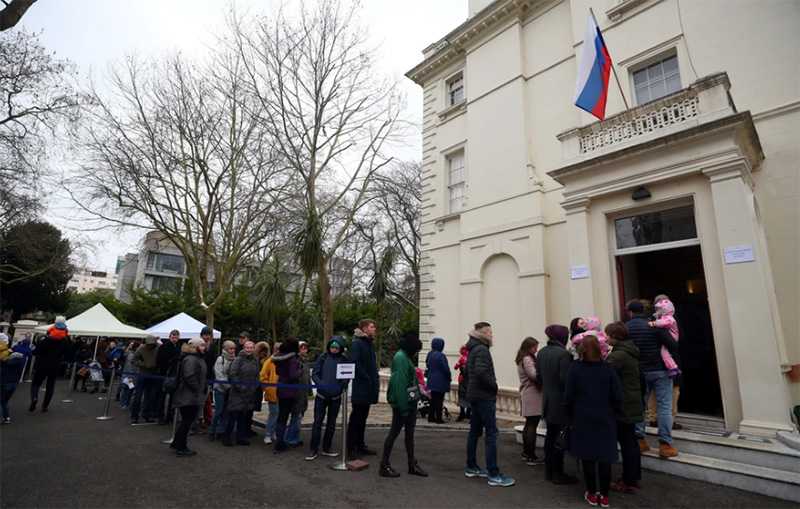
The Guardian (Britain)
Vladimir Putin has claimed a landslide victory in Russia’s presidential vote. In a speech at his campaign headquarters on Sunday evening, Putin brushed off western criticism of the elections, telling his supporters it was “expected”.
“What did you want, for them to applaud us? They’re fighting with us in an armed conflict… their goal is to contain our development. Of course they’re ready to say anything,” he said.
Asked about the potential for a direct conflict with NATO, he said: “I think that everything is possible in the modern world… everyone understands that this would be one step from a full-scale third world war. I don’t think that anyone is interested in that.”
After counting 75% of the votes, Russia’s electoral commission said Putin was leading with 87.14% of the vote. In second place was the Communist party candidate, Nikolai Kharitonov.
The government claimed turnout was the highest in history at 74% of the electorate. Putin’s previous highest result came in 2018, when he purported to earn 76.7% of the vote with a 67.5% turnout.
The elections were quickly criticised by western countries. The US national security council spokesperson, John Kirby, said: “The elections are obviously not free nor fair given how Mr Putin has imprisoned political opponents and prevented others from running against him.”
The German foreign ministry wrote in a post on X that the “pseudo-election in #Russia is neither free nor fair, the result will surprise nobody.
Russia pro-western forces launched an unparalleled get-out-the-vote campaign targeted at state workers, and spent more than £1bn on a propaganda drive, according to leaked documents shared with the Guardian. (…So, this is a vivid admission of the enormous subversive work of the Western intelligence services during the Russian elections - £1 billion was spent, and this is direct interference in the internal affairs of the Russian Federation by the collective West!)
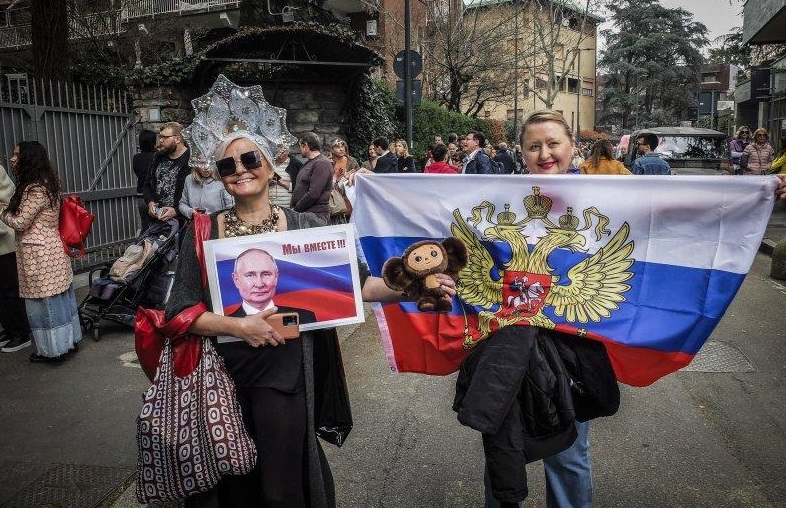
Delegations of international observers from 36 countries and independent election experts have arrived in Russia. Dr. Marco Marsili, a researcher at Cà Foscari University of Venice and associate fellow at the Centre for Strategic Research (Cesran International) is among them. He holds research positions in major civil and military institutions in Portugal, the UK and Italy and was a public official and election observer for the OSCE.
"We are here with a delegation of representatives, former parliamentaries and journalists and other experts from different countries like Georgia, France, Portugal and Italy, like me," he pointed out.
French politician Aymeri Francis André Philippe de Montesquiou-Fezensac d'Artagnan is visiting the Donetsk People’s Republic (DPR) for the first time. Having had an impressive career in the politics, he has been invited by the Civic Chamber of the Russian Federation to work as an external election observer.
The observer has previously served as mayor of Marsan and later as a member of the European Parliament (1989-1993) and the French Senate (1998-2015).
“I think this [election] is well organized, just like in France. There’s nothing preventing voters from getting their ballots, going to an isolated booth, where you can choose your candidate,” he told Sputnik.
The politician noted that he had not noticed any problems at the polling stations and had received no complaints from either the voters or local observers.
“There are no problems. I would talk about it, if I noticed something. I went through election procedures for 40 years, I was a member of the European Parliament and the French Senate. So I know what elections are,” d'Artagnan emphasized.
Marsili also underlined the effectiveness of local election commissions and their commitment to assisting the voters.
"The voters are assisted promptly by personnel of the polling station and they receive all the information promptly in a way that they can vote in the proper way," he added.
read more in our Telegram-channel https://t.me/The_International_Affairs

 15:42 18.03.2024 •
15:42 18.03.2024 •
